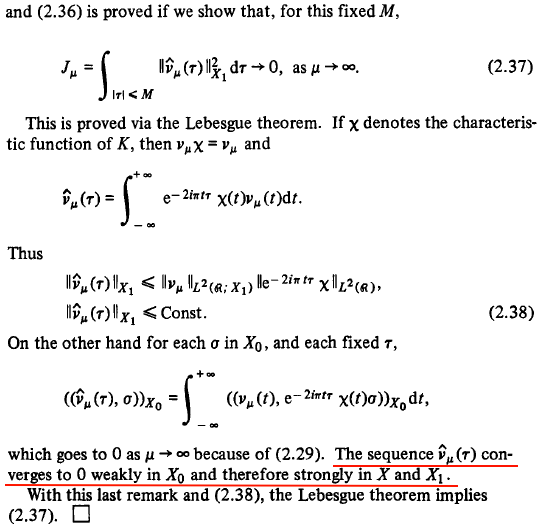In the proof of a compactness theorem involving fractional derivatives in Temam's Navier-Stokes Equations, an argument as the following is made.
Suppose $X_0,X,X_1$ are Hilbert spaces such that $ X_0\overset{\textrm{cpt}}{\hookrightarrow} X\hookrightarrow X_1. $ Suppose $\gamma>0$. Suppose $v_m$ is a sequence all supported in a bounded subset $K$ of $\mathbb{R}$ such that
- $v_m\to 0$ in $L^2(\mathbb{R};X_0)$ weakly; (2.29)
- $|\xi|^\gamma\hat{v_m}\to 0$ in $L^2(\mathbb{R};X_1)$ weakly. (2.30)
Then for (fixed large enough) $M>0$, $$ \lim_{m\to\infty}\int_{|\xi|\leq M}\|\hat{v_m}(\xi)\|_{X_1}^2\ d\xi\to 0.\tag{1} $$
Here is my question: Would anybody elaborate why this is true?
[Added:] For $u:\mathbb{R}\to X_1$, $\hat{u}$ denotes the Fourier transform (when exists) $$ \hat{u}(\xi)=\int_\mathbb{R}e^{-2\pi i \xi x}u(x)\ dx. $$
[Added later 11/26/16] In order to show (1) by the Lebesgue dominated convergence theorem, one essentially needs the following:
- Show that for each $\xi$ with $|\xi|\leq M$, $\|\hat{v_m}(\xi)\|_{X_1}^2\to 0$ as $m\to\infty$. This is the same as saying that $\hat{v_m}(\xi)\to 0$ in $X_1$ strongly and it is done by showing that $\hat{v_m}(\xi)\to 0$ in $X_0$ weakly thanks to the elaboration in Fabian Wirth's answer.
- Show that the map $\xi\mapsto 1_{|\xi|\leq M}\|\hat{v_m}(\xi)\|^2_{X_1}$ is dominated by some integrable function. (This step has not been elaborated yet.) The argument for this given by the proof is as follows:
The assumption regarding the supports of $\{v_m\}$, we have $v_m=1_Kv_m$ and thus $$ \hat{v_m}(\xi)=\int_{\mathbb{R}}e^{-2\pi it\xi}1_K(t)v_m(t)\ dt, $$ which implies by Cauchy-Schwartz that for each $\xi$, $$ \|\hat{v_m}(\xi)\|_{X_1}\leq\|v_m\|_{L^2(\mathbb{R};X_1)}\|e^{-2\pi it\xi}1_K\|_{L^2(\mathbb{R};X_1)}. $$ The proof in the book immediately concludes that $$ \|\hat{v_m}(\xi)\|_{X_1}\leq C $$ for some constant $C$. Here is my follow-up question: How does one know that $C$ is independent of $m$?
[Added:] Here is the author's original argument:

